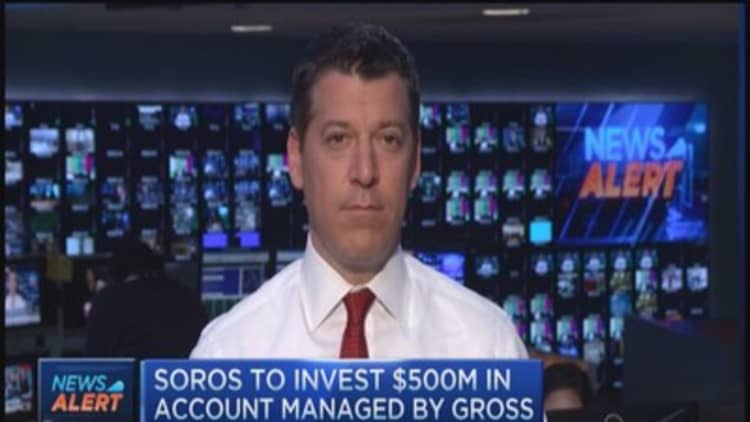Central banks are trying to solve a debt crisis by piling on more debt, creating a "point of low return" for investors, bond guru Bill Gross said in a letter to clients.
The Janus Capital portfolio manager and Pimco founder takes the Federal Reserve, Bank of Japan and European Central Bank to task for using monetary policy to make it easier for governments to run up debt, all in the hopes of stimulating anemic global growth.
"How could they?" Gross asks, using nursery rhymes including the characters Punch and Judy to bemoan the possibility of "inflationary horror" that characterized the 1970s. It's probably better to read the Gross letter in its entirety—get it here—to see how he connects the dots, but his conclusion is stark:
Ah, policymakers. Perhaps the last five years have been one giant nursery rhyme. But each of these central bankers is trying to achieve the same basic objective: Solve a debt crisis by creating more debt. Can it be done? A few years ago, I wrote that this uncommonsensical feat could be accomplished, but with a number of caveats: 1) Initial conditions must not be onerous; 2) Both monetary and fiscal policies must be coordinated and lead to acceptable structural growth rates; and 3) Private investors must continue to participate in the capital market charade that such policies produced.

Several pitfalls have occurred within each caveat, not the least of which is stagnant growth and companies using the easy money of the past six years not to propel the economy but to jack up their own stock prices and reward themselves and shareholders.
Read MoreThe great distortion? Draghi's options on QE
At the same time, the much-awaited handoff from monetary to fiscal policy has not happened, in large part because the Fed and others have been willing to provide trillions in accommodation:
In the U.S., as elsewhere, there has been little focus on public investment and infrastructure spending. It's been all monetary policy, all of the time, with most of the positives flowing over to markets as opposed to the real economy. The debt currently being created is not promoting real growth and solving a debt crisis—it is being used by corporations to repurchase shares and accentuate the growing inequality between the very rich and the middle class.
Gross' general outlook has been of a long-term climate of low returns and low growth, and the position hasn't always worked out so well. At Pimco, the firm's flagship fund over the past few years has underperformed benchmarks and bled investor money, while investors have enjoyed a robust stock market and a resilience in U.S. government debt.
At his new firm, the Janus Global Unconstrained Bond Fund has pulled in $442.9 million in investor money during its short life and has modestly outperformed its benchmark.
Read MoreGross running Janus? 'That's not going to happen'
Gross, though, paints a bleak outlook if not for his fund then for an investing climate dominated by free-wheeling central banks:
How could they? How could policymakers have allowed so much debt to be created in the first place, and then failed to regulate their own system accordingly? How could they have thought that money printing and debt creation could create wealth instead of just more and more debt? How could fiscal authorities have stood by and attempted to balance budgets as opposed to borrowing cheaply and investing the proceeds in infrastructure and innovation? It has been a nursery rhyme experience for sure, but more than likely without a fairy tale ending.






